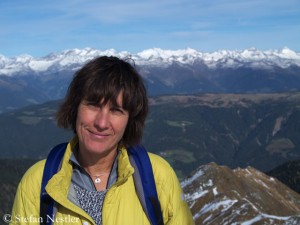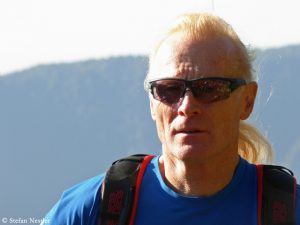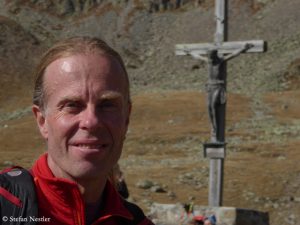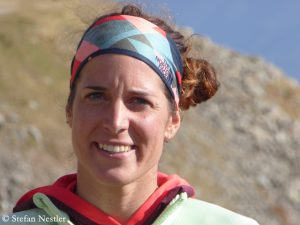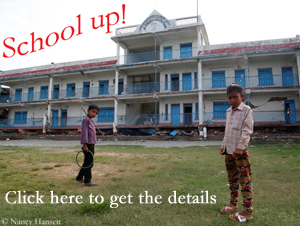Destivelle: “Crazy what’s happening on Everest”
She looks younger than she really is (53 years) and her eyes twinkle when she is talking about climbing. 20 years ago Catherine Destivelle of France was a star of the climbing scene: Inter alia she soloed the classical north faces of Eiger, Matterhorn and Grand Jorasses, all of them in winter. She free-climbed the more than 6000-meter-high Nameless Tower in the Karakoram. (If you want to get an impression of her style of climbing, watch the amazing video below!) After the birth of her son Victor in 1997 she scaled down her climbing activities. I talked to Catherine on a hike during the International Mountain Summit (IMS) in Brixen in South Tyrol.
Catherine, are you still climbing?
Yes, less, but I’m still climbing. I like it. When I have time or holiday, I do it several times a week.
When you did your great climbs, in the 1980s and beginning of the 90s, you were a pioneer of women climbing. What has changed since then?
I think it’s a normal evolution. Women climbers of today are better than in our times, because they are training since their youth. Climbing has become a real sport. In my day it just had started to be a sport, but wasn’t really.
Do you think nowadays it’s easier for young women to be professional climbers?
I’m not sure. There are a lot of women climbers, so maybe it’s more difficult. At my time we were only a few, about one in each country. So it was probably easier to live from climbing.
Catherine Destivelle: Probably more difficult
Do you still follow what’s going on in the Himalayas?
I still know what’s going on, but I’m not dreaming about that. I’m quite jealous because I am not able to go away for a long time. But one day I will decide to take my time to come back to do some little climbs in the Himalayas.
You did it in the 1990s, when you were on Makalu, Shishapangma – and on the Annapurna South Face too. Just two weeks ago Ueli Steck did a solo climb through this wall in only 28 hours for up and down, climbing during the night. What do you think about his climb?
I think it’s the safest way to act in the Himalayas to be fast. So you don’t lose much energy and you keep your mind straight. (laughs) Erhard Loretan did the same. He was climbing very fast in high altitude.
When you were on expedition in the Himalays in the 90s, there were not so many climbers in the mountains. Things have changed, especially on Everest.
Everest was not one of my goals because I liked technical routes. Those were my favourite climbs. But climbing technical routes in high altitude is very dangerous. I was scared, I didn’t want to take any risk. So I decided not to go on very high peaks. Climbing Everest on the normal route was not attractive for me at that time. Now there are too much people. So I’m not sure that I will go there one day (laughs). I think it’s crazy. Just because it’s Everest, everybody goes there. They don’t know how to climb and how to deal with any problem. They need fixed ropes, they don’t know how to move without a rope. If there is an avalanche or a serac fall like on Manaslu in 2012, a huge catastrophe happens. On K 2 it was the same a few years ago: Climbers lost their lives because they were not real alpinists. I think it’s quite dangerous if there are too much people on a high peak.
Catherine Destivelle: Too much people on Everest
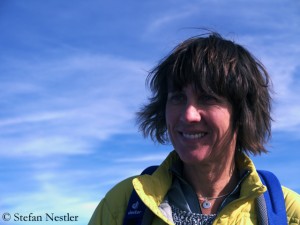 What was the reason that you stopped extreme climbing in the mid of 1990s? Was it your accident during a climb in Antarctica when you had a compound fracture of your leg?
What was the reason that you stopped extreme climbing in the mid of 1990s? Was it your accident during a climb in Antarctica when you had a compound fracture of your leg?
No, it was not the accident. I wanted to have a kid (laughs). Victor. I preferred to care of him. I’m like a chicken, I don’t want to leave my son alone. I like to share my days with him. I still climb but I want to make sure that my son is happy. That’s the most important thing for me. I travel with him, but he is not focused on climbing, so I’m going to the seaside with him (laughs), kitesurfing, stuff like that.
If you should give an advice to young climbers, especially female climbers, what would you say?
You have to like it and to follow your instinct. Be happy, then you have a chance to be good at it. If you want to be very good, train a lot! Meet very experienced people to get inspired, take their advice!
Catherine Destivelle: Like it and follow your instinct!
What about courage?
You don’t need to have courage if you like it (laughs). You have your passion. You have to train and to be focused on this, if you want to succeed. But that’s all. Courage is something else. For me courage means for example risking your life for an idea.



